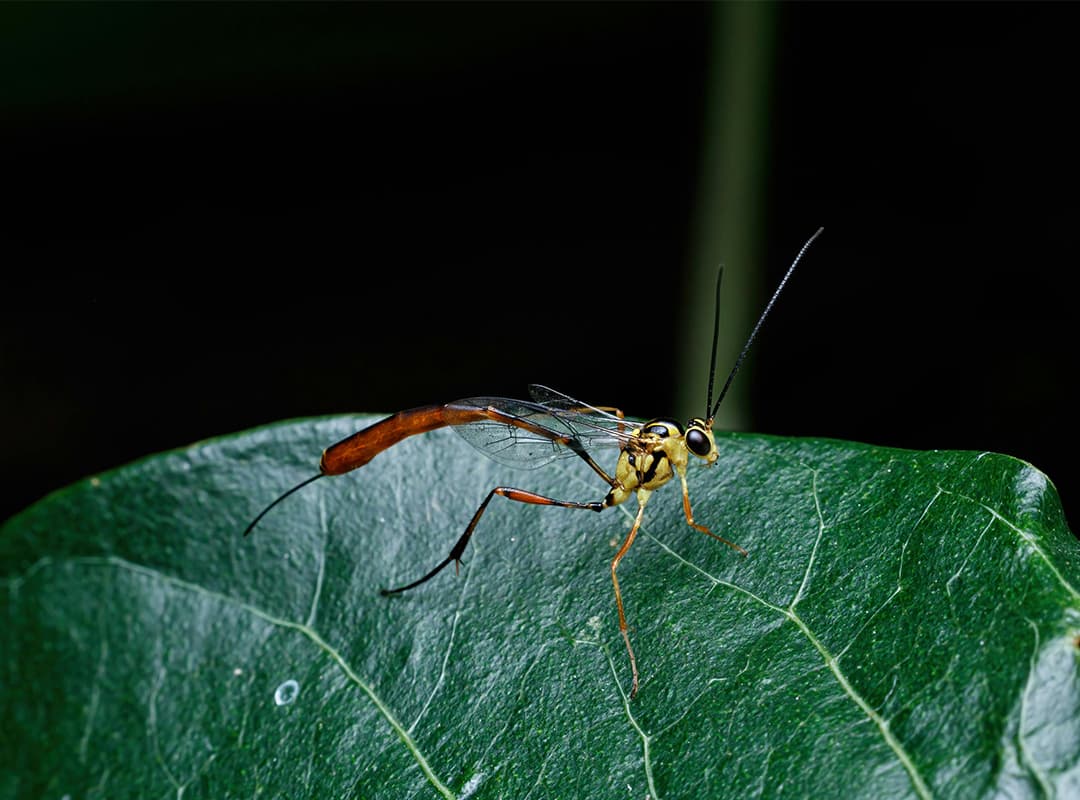Parasitoid wasps play a crucial role in maintaining ecological balance in natural ecosystems. Their unique lifestyle of parasitizing other insects makes them key players in complex food chains and natural regulators of insect pests. In this article, let’s look at how parasitoid wasps influence ecological balances and how their activities contribute to ecosystem resilience.
Role of Parasitoid Wasps in Food Chains
Parasitoid wasps occupy a special place in ecosystem food chains as intermediate predators. They control the numbers of their victims – the insects on which they parasitize, which prevents excessive reproduction of pests and maintains a balance between different trophic levels.
The main role of parasitoid wasps is to control the numbers of insects that may become plant pests. For example, many wasp species parasitize caterpillars, aphids, and beetles that can cause severe damage to crops and woodlands. By limiting populations of these pests, parasitoid wasps prevent their mass reproduction, which helps to maintain healthy ecosystems.
The impact of parasitoid wasps on the ecosystem goes beyond pest population control. Their presence can also affect other insect species, including competitors and potential predators. For example, a decrease in pest populations due to wasps may lead to an increase in populations of other insects that are not under such pressure. Thus, parasitoid wasps affect the balance of the entire insect community by regulating interactions between different species.
Ecological Importance of Parasitoid Wasps in Different Habitats
Parasitoid wasps successfully adapt to different habitats and fulfill their functions in both natural and anthropogenically altered ecosystems.
In forests, parasitoid wasps play a critical role in maintaining the health of woody vegetation. They control the numbers of insects that can damage trees, such as bark beetles and caterpillars. Without the presence of parasitoid wasps, populations of these pests could multiply uncontrollably, resulting in significant tree losses and deterioration of forest ecosystems. Wasps also contribute to forest biodiversity by maintaining a balance between different insect species.
In agricultural ecosystems, parasitoid wasps are often considered as biological agents that can replace or supplement the use of chemical pesticides. They help to maintain balance in agroecosystems by controlling the abundance of pests such as aphids and other insects that damage crops. The use of parasitoid wasps helps to reduce dependence on chemical defenses, which benefits the sustainability of agricultural systems and reduces environmental stress.
In urban settings, parasitoid wasps can also serve important functions by regulating pest populations in gardens, parks and green spaces. For example, wasps can control aphid populations on ornamental plants, which contributes to the health of urban flora. The impact of wasps on urban ecosystems helps to maintain ecological balance and reduce the need to use chemical plant protection products.
Adaptations and Success of Parasitoid Wasps
Parasitoid wasps show a high degree of adaptability, making them successful agents of natural control.
Many species of parasitoid wasps have a high degree of specialization on specific hosts. This allows them to efficiently find and infect their victims while minimizing competition with other parasitoid species. This specialization helps to maintain stable populations of both wasps and their victims, which plays an important role in ecological balance.
Wasps exhibit complex behaviors that help them find their hosts even in difficult environments. For example, they can use chemical signals emitted by plants or prey to pinpoint the location of their hosts. These adaptive abilities allow wasps to perform effectively in a wide variety of ecosystems.
Parasitoid wasps are important regulators of ecological balances in a variety of ecosystems. Their ability to control insect pest populations and interact with other species makes them key players in food chains and natural processes. The impact of wasps on forest, agricultural, and urban ecosystems demonstrates their indispensable role in maintaining the health and sustainability of natural systems. Given the ecological importance of these insects, their protection and proper utilization in biological control represent important challenges for biodiversity and ecosystem stability.
